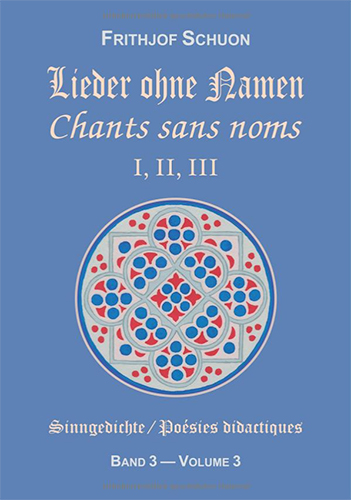
Frithjof Schuon Archive

Briefe
| Titel | Zusammenfassung | Publication Data | Dated |
|---|---|---|---|
| Extract from a letter from Frithjof Schuon | Regarding the question of transubstantiation, which I address briefly in Logic and Transcendence, the Oriental character of the words in question can be seen in their use of ellipsis: Christ did not say, “I am like a vine, like a door”, but he said, “I am the vine, the door”; likewise he did not say, “This conveys divine power in the same way my body conveys divine power”, but he said, “This is my body”. | Logic & Transc. p.237 | 02/01/1976 |
| Extract from a letter from Frithjof Schuon | One should not reproach a science for not being what it does not want to be or for not providing what it does not want to provide. In this respect one should not criticize modern chemistry insofar as it studies the phenomena it intends to study, for on its limited plane it remains within adequation and is not exceeding its strengths; nor can one blame it for remaining within the strictly human perspective in relation to matter, for it need not go beyond this point, and indeed no physical science needs to do so. | Logic & Transc. p.235 | 06/22/1964 |
Featured Books
Lieder ohne Namen : Chants sans noms (Kollektion I, II, III) (Taschenbuch)
Eine Sammlung von 405 kurzen Gedichten von F. Schuon (1907-1998), zum Thema Güte, Selbsterkenntnis und Gott, etc. Diese Epigramme, inspiriert von den Lehren antiker und moderner Philosophen aus Ost und West, bieten eine spirituelle Antwort.
Featured Poems
Adastra and Stella Maris: Poems by Frithjof Schuon-Society
Thou art a man, and among men thou must live;
Adastra and Stella Maris: Poems by Frithjof Schuon-Petition
Praise of God and thanks to God; and then another
Adastra and Stella Maris: Poems by Frithjof Schuon-Ridgepath
Man must cling to the essential
Featured Articles
A Knowledge That Wounds Our Nature: The Message of Frithjof Schuon
This essay’s objective is to „enter … into Schuon’s own perspective, to understand him on his own terms, and to see how he envisions certain crucial ideas“ and to explore why Schuon’s work is at once both provocative and inviting to so many readers.
The ‚Preface‘ by Seyyed Hossein Nasr to “Dimensions of Islam”
Dr. Seyyed Hossein Nasr uses this „Preface“ to explain that Frithjof Schuon’s writings on Islam, in this book as well as in others, is noteworthy for its focus on the „integral message“ of the Islamic tradition. Schuon’s analyses are, here as elsewhere, free of academic superficialities, bring to light „the most inward aspect of the Islamic message.“
Signs of the Supra-Sensible: Frithjof Schuon on the Natural Order
Author Prof. Harry Oldmeadow states that the goal of this essay is to „provide a sketch, largely through direct quotation, of a few of the key principles and doctrines which govern Schuon’s understanding of the natural order.“ This can assist us, because today we „witness a plethora of writings on the ‚ecological crisis,‘ often well-intentioned and sometimes enlivened by partial insights, but fundamentally confused because of an ignorance of timeless metaphysical and cosmological principles. It has been the task of figures such as René Guénon, Ananda Coomaraswamy and Frithjof Schuon, authoritative expositors of the sophia perennis, to remind the modern world of those principles.“
